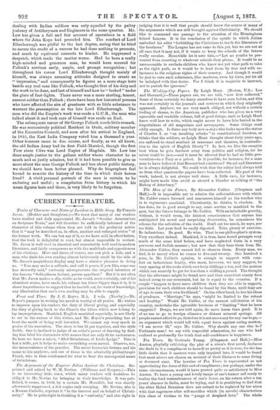The Man of the Future. By Alexander Calder. (Chapman and
Hall.)—It is impossible not to admire the self-confidence with which Mr. Calder comes forward and announces himself as the teacher who. is to regenerate mankind. Christianity, he thinks, is obsolete. It has done, he is good enough to say, some service to mankind in the past, but the future belongs to Mr. Calder. With an inimitable gravity, without, it would seem, the faintest consciousness that anyone has anticipated his novel and surprising discoveries, he announces his scheme for the salvation of the world. Don't eat too much, he says, nor too little. Let your food bo easily digested. Take plenty of exercise. Be industrious. Be good. Be wise. That is our philosopher's system. Very excellent indeed. Mankind, it is true, have heard precepts very much of the same kind before, and have neglected them in a very perverse and foolish manner ; but now that they hear them from Mr. Alexander Calder, they cannot fail to observe them. Every man, we find, is to marry when he comes to five-and-twenty. One hundred a. year, in Mr. Calder's opinion, is enough to support with com- fort an industrious family, who must, however, we may suggest, be very sparing of the coals which cost forty shillings a ton, and the mutton which can scarcely be got for loss than a shilling a pound. The thought that the allowance might be found now and then somewhat scanty does indeed occur to our economist, but he is equal to the occasion. If a couple "happen to have more children than they are able to support, provision for such children should be found by the State, until they are of age to earn their own livelihood." On the other hand, he has his ideas of prudence. "Marriage," he says, "might bo limited to the robust and healthy." Would Mr. Calder, at the earnest solicitation of his country, undertake the agreeable business of " limiting " that he here suggests ? Drugs, we are told again, do more harm than good. It is of no use to go to foreign climates or distant mineral springs. All people cannot afford to go, therefore it is not necessary for any one to go,— an argument which would tell with equal force against eating mutton. "I am never ill," says Mr. Calder. Why should any one else be? Fortunate man ! we say with respectful admiration, for one who had realised so profoundly the truth that self-confidence is happiness.






























 Previous page
Previous page